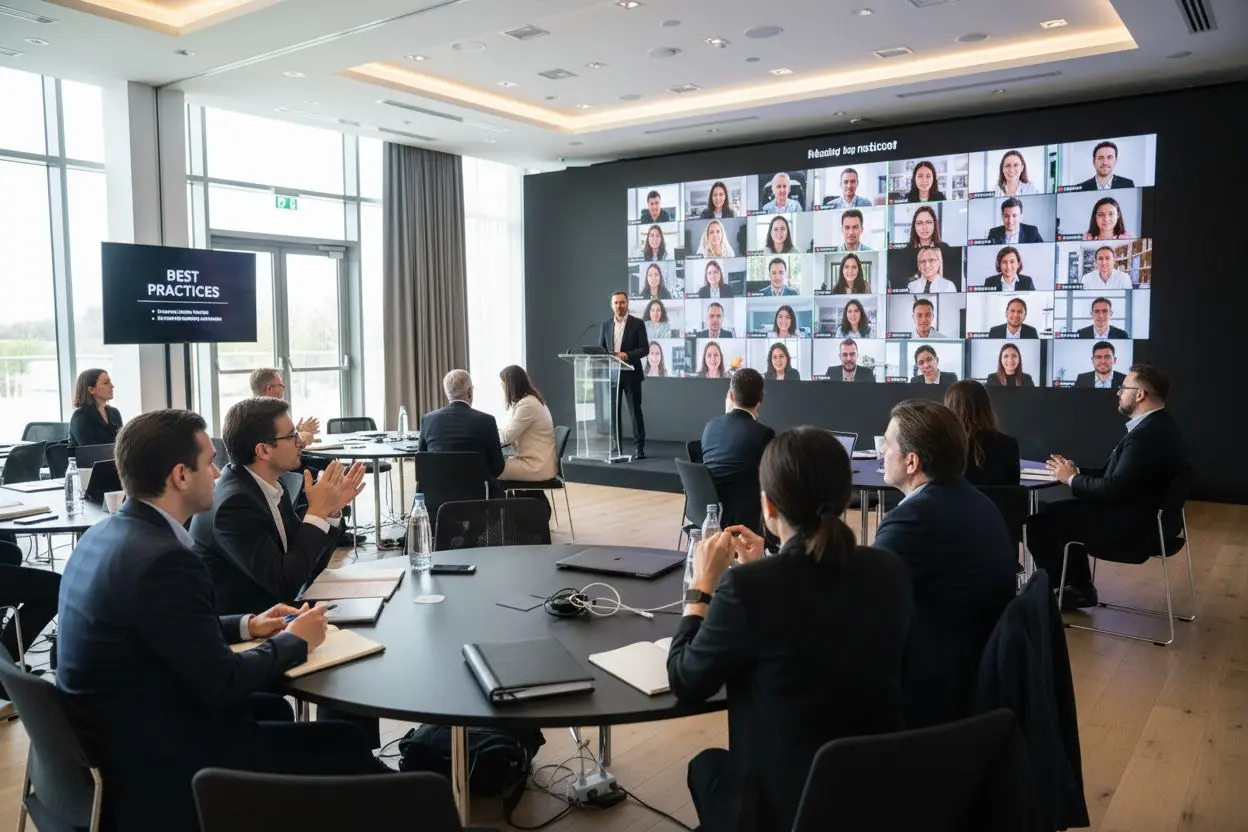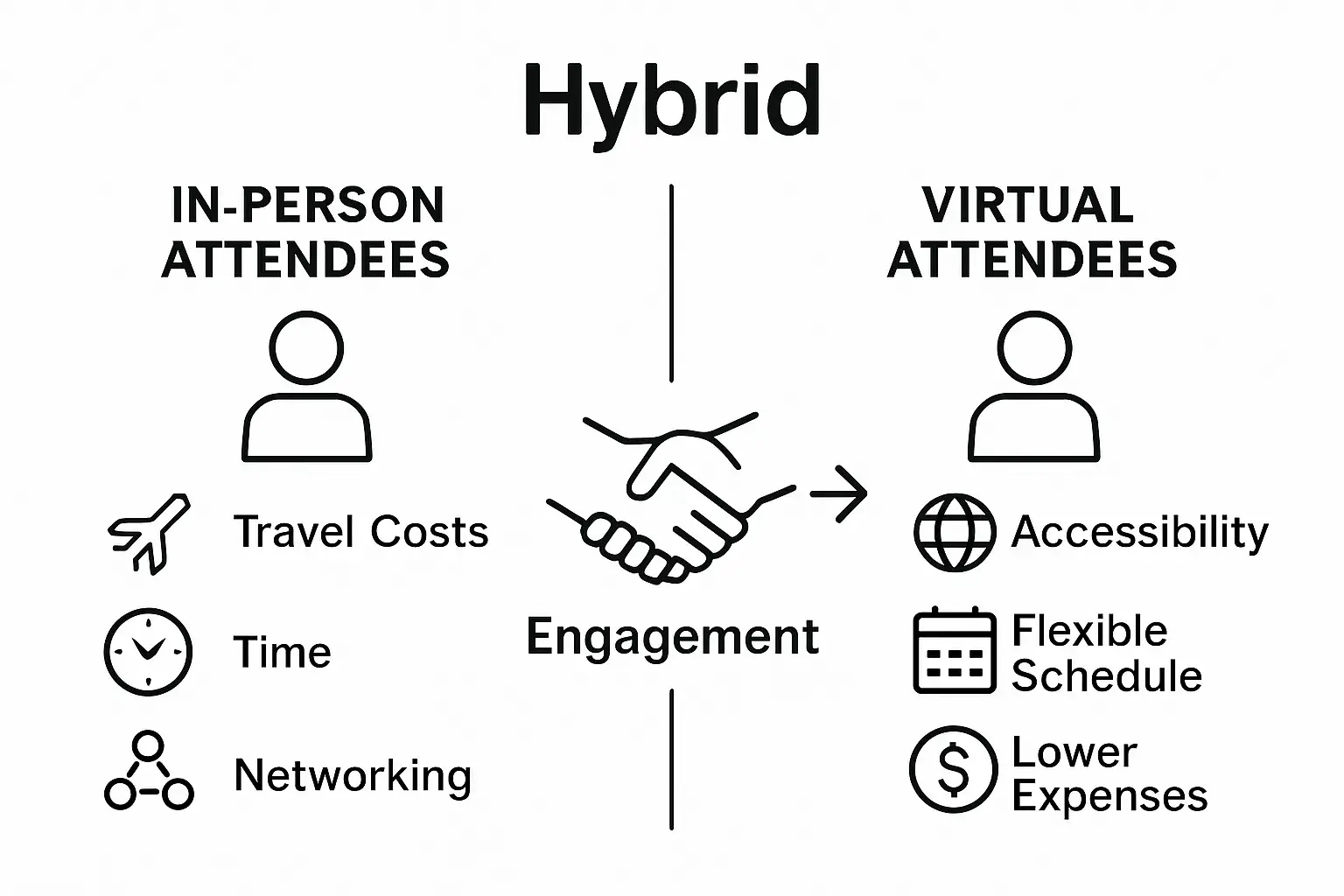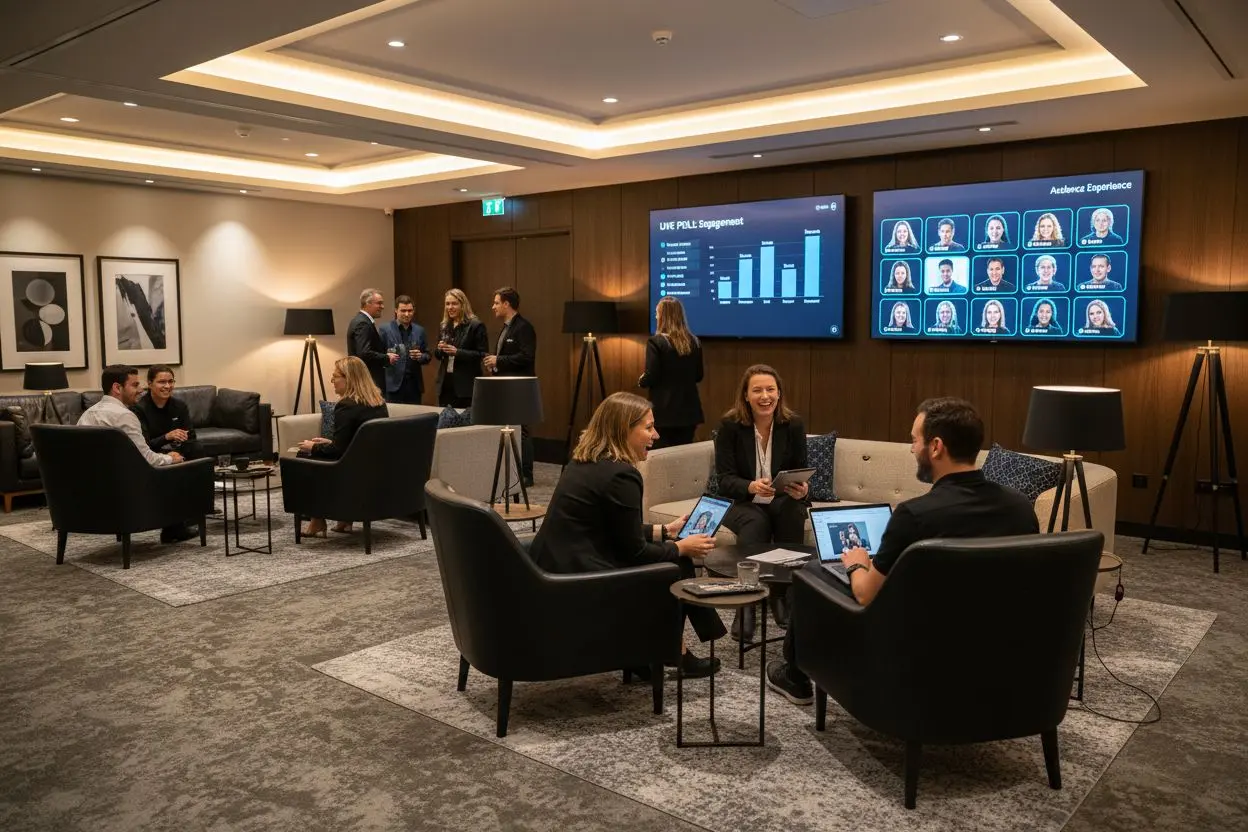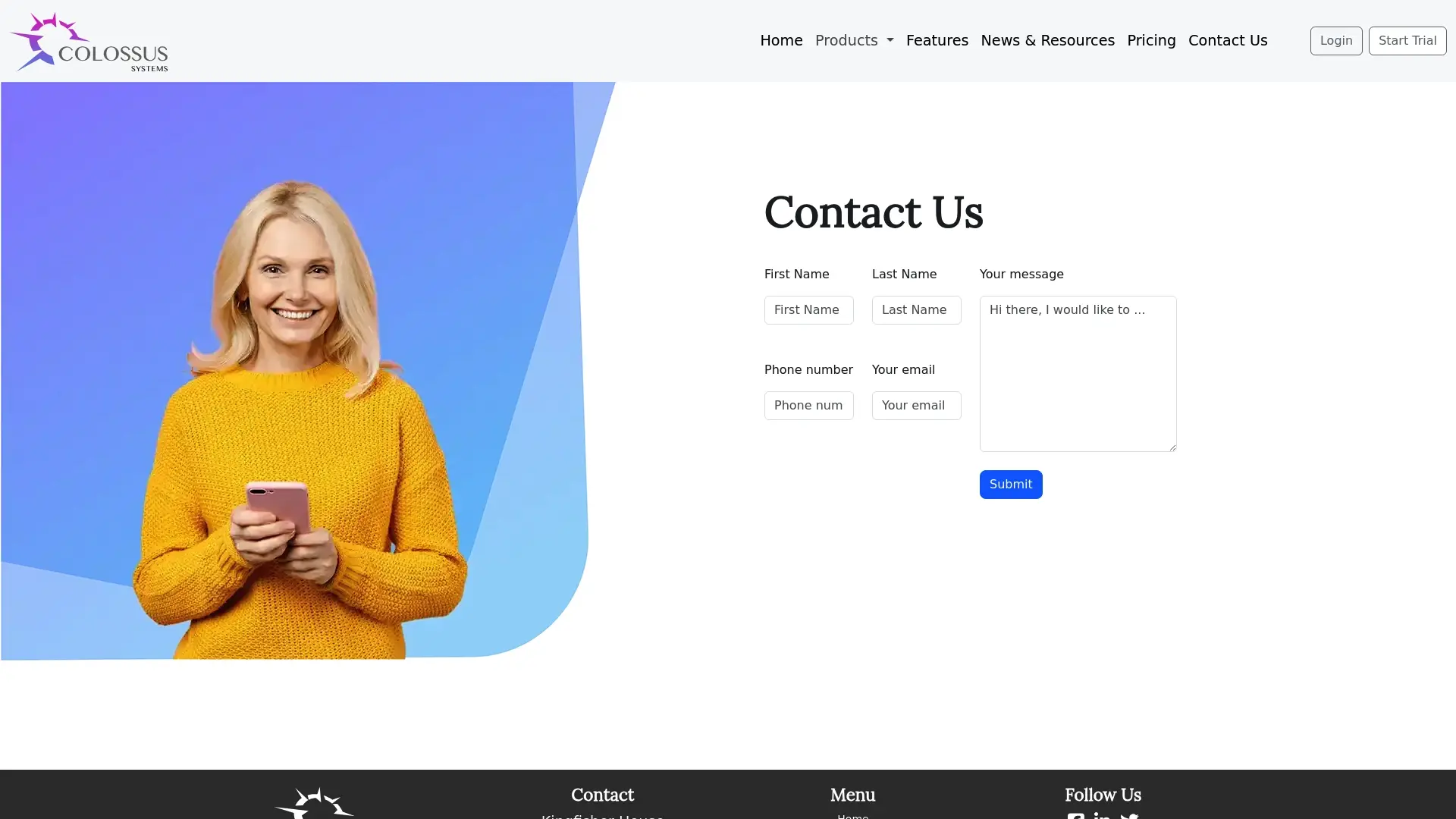Understanding Hybrid Event Best Practices for Success

Hybrid events are transforming the way organisations bring people together, blending in-person and virtual experiences to make gatherings accessible to more people than ever. Think events were all about who could travel and fit into a venue? Not anymore. Over 70 percent of event professionals now believe hybrid formats are here to stay, letting anyone join from anywhere and changing how we connect for good.
Table of Contents
- What Are Hybrid Events And Why They Matter
- Key Components Of Successful Hybrid Events
- Understanding The Audience Experience In Hybrid Events
- Technological Considerations For Hybrid Formats
- Measuring Success: Metrics For Hybrid Events
Quick Summary
| Takeaway | Explanation |
|---|---|
| Hybrid events combine in-person and virtual formats | This approach allows organisations to expand their reach and enhance audience engagement through multiple channels of participation. |
| Invest in robust technology for better engagement | High-quality streaming and interactive digital tools lead to significantly improved participant engagement and interaction during events. |
| Create inclusive experiences for all attendees | Design content and interactions that are tailored to meet the diverse needs of both physical and virtual participants, ensuring everyone feels valued. |
| Measure success using comprehensive metrics | Track various engagement indicators to evaluate both immediate and long-term outcomes of hybrid events for strategic growth. |
| Focus on emotional connection and community building | Cultivate meaningful interactions and networks among participants to foster a sense of belonging, enhancing the overall event experience. |
What are Hybrid Events and Why They Matter
Hybrid events represent a sophisticated approach to gathering that combines both in-person and virtual participation, allowing organisations to expand their reach beyond traditional physical boundaries. These innovative event formats enable participants to engage through multiple channels, creating flexible and inclusive experiences that transcend geographical limitations.
The Fundamental Structure of Hybrid Events
At its core, a hybrid event integrates live, physical attendees with remote participants who join via digital platforms. This model allows organisations to simultaneously host an event in a physical venue while streaming content, facilitating real-time interactions, and providing comprehensive engagement opportunities for both in-person and virtual audiences.
The following table summarises the fundamental components of hybrid events, helping to clarify how each element contributes to creating a cohesive and engaging hybrid experience.
| Component | Description |
|---|---|
| Physical Event Location | On-site venue where live, in-person attendance takes place |
| Digital Streaming Technologies | Tools that broadcast event content to remote participants |
| Interactive Online Platforms | Digital environments enabling Q&A, chat, and collaborative features |
| Synchronised Content Delivery | Coordinated sharing of materials and presentations across platforms |
| Multiple Engagement Channels | Methods for participant interaction including online and in-person |
Key Components of Hybrid Events Include:
- A physical event location with live participants
- Digital streaming technologies
- Interactive online platforms
- Synchronised content delivery
- Multiple engagement channels
Why Hybrid Events Matter for Modern Organisations
Hybrid events have emerged as critical tools for organisations seeking to maximise their reach and engagement. Research from EventMB indicates that over 70% of event professionals believe hybrid formats will remain significant beyond pandemic-related restrictions. These events provide unprecedented flexibility, allowing participants with diverse needs and constraints to access valuable content and networking opportunities.
The strategic advantages of hybrid events are profound. They eliminate geographical barriers, reduce travel costs, accommodate different learning preferences, and create more inclusive environments.
 By offering multiple participation modes, organisations can attract broader audiences, increase event accessibility, and generate more comprehensive engagement metrics.
By offering multiple participation modes, organisations can attract broader audiences, increase event accessibility, and generate more comprehensive engagement metrics.
Moreover, our guide on hybrid event planning can help organisations understand how to design these complex yet rewarding event experiences effectively, ensuring maximum participant satisfaction and organisational impact.
Key Components of Successful Hybrid Events
Successful hybrid events require strategic integration of technological infrastructure, engaging content design, and seamless participant experience management. While complex in execution, these events demand careful planning across multiple interconnected domains to ensure meaningful interaction for both physical and virtual attendees.
Technology and Digital Infrastructure
The technological backbone of hybrid events represents a critical foundation for success. Robust streaming platforms and interactive digital tools must provide reliable, high-quality connections that minimise technical disruptions. Research from EventTech indicates that organisations investing in professional-grade streaming technologies experience 40% higher participant engagement rates.
Essential Technical Components Include:
- High-definition video streaming capabilities
- Real-time audio synchronisation
- Interactive chat and Q&A features
- Stable internet bandwidth management
- Multi-platform compatibility
Content Design and Participant Engagement
Hybrid event content must be meticulously crafted to maintain consistency and engagement across physical and digital platforms. This requires developing presentation materials that translate effectively between in-person and online environments, ensuring all participants receive equivalent learning experiences.
Strategic content design involves creating modular presentations that can be consumed dynamically, with interactive elements that encourage participation regardless of attendee location. Our online event management guide provides comprehensive insights into designing engaging digital experiences that maintain audience attention.
Participant Experience Management
Managing participant experience in hybrid events demands a holistic approach that addresses the unique needs of both physical and virtual attendees. This involves creating inclusive environments where digital participants feel equally valued and integrated into the event ecosystem. Technical facilitators must proactively monitor digital interactions, manage technical support channels, and ensure smooth transitions between different event segments.
Successful hybrid events blur the boundaries between physical and digital spaces, creating unified experiences that transcend traditional event limitations. By prioritising technological reliability, thoughtful content design, and comprehensive participant management, organisations can unlock the transformative potential of hybrid gathering formats.
Understanding the Audience Experience in Hybrid Events
Hybrid events demand nuanced understanding of participant engagement across physical and digital environments. The audience experience represents a complex ecosystem where participants expect personalised, seamless interactions that transcend traditional event participation boundaries.
Personalisation and Accessibility
Audience-centric design becomes paramount in hybrid event experiences. Research from Asia Insurance Review highlights that successful hybrid events recognise distinct participant needs across different engagement platforms.
Key Personalisation Strategies Include:
- Customised content pathways for virtual and physical attendees
- Adaptive interaction mechanisms
- Flexible participation timelines
- Individual preference tracking
- Multi-channel communication options
Technology as an Engagement Enabler
Technology transforms audience experience by creating interactive, immersive environments that bridge geographical limitations. Advanced digital platforms enable real-time polling, networked discussions, and seamless content sharing, ensuring participants feel connected regardless of their physical location.
Intelligent engagement tools allow organisers to capture granular participant data, enabling more targeted and responsive event experiences. Our event marketing strategies guide provides deeper insights into leveraging technology for enhanced participant interaction.
Emotional Connection and Community Building
Beyond technological capabilities, successful hybrid events cultivate emotional engagement and community sentiment. This involves creating inclusive spaces where both physical and virtual participants feel genuinely valued, heard, and integrated into the collective event narrative.
Achieving this requires intentional design that considers psychological aspects of participation, such as creating opportunities for meaningful networking, facilitating interactive discussions, and maintaining consistent energy across different participant groups. The goal is to transform hybrid events from mere information transmission platforms into dynamic, interconnected community experiences.

Technological Considerations for Hybrid Formats
Technological infrastructure represents the critical foundation that determines the success of hybrid events. Organisations must strategically select and integrate digital tools that facilitate seamless, high-quality interactions between physical and virtual participants, ensuring comprehensive engagement across multiple platforms.
Streaming and Connectivity Solutions
Reliable streaming technologies form the cornerstone of effective hybrid event experiences. Research from Streaming Technology Insights indicates that organisations require multi-layered technological approaches to manage complex digital engagement requirements.
Critical Connectivity Components Include:
- Low-latency video streaming platforms
- Redundant internet connection strategies
- Professional audio visual equipment
- Cloud-based content management systems
- Adaptive bitrate streaming technologies
Interactive Digital Platform Integration
Successful hybrid events demand sophisticated digital platforms that enable real-time interaction, content sharing, and participant engagement. These platforms must support diverse functionalities such as live polling, breakout sessions, networking opportunities, and comprehensive analytics tracking.
Advanced platforms go beyond simple streaming, offering intelligent interaction mechanisms that create immersive digital experiences. Our online event management guide provides comprehensive insights into selecting robust digital event infrastructure.
Technical Support and Contingency Planning
Robust technical support represents a crucial yet often overlooked aspect of hybrid event technology. Organisations must develop comprehensive contingency plans that address potential connectivity issues, provide immediate technical assistance, and ensure smooth transitions between different event segments.
Effective technical management involves proactive monitoring, dedicated support channels, and rapid response protocols. By anticipating potential technological challenges and implementing strategic mitigation strategies, organisations can create resilient hybrid event experiences that maintain high levels of participant satisfaction and engagement.
Measuring Success: Metrics for Hybrid Events
Measuring success in hybrid events requires comprehensive, multidimensional analytics that capture both quantitative and qualitative participant engagement across physical and digital platforms. Traditional event measurement approaches prove insufficient for capturing the nuanced interactions inherent in hybrid event formats.
Engagement and Participation Metrics
Comprehensive engagement tracking enables organisations to understand participant behaviour and event effectiveness.
This table provides an overview of key engagement and participation metrics for hybrid events, making it easy to see which indicators are vital for measuring success across both physical and digital platforms.
| Metric | What It Measures |
|---|---|
| Total Participant Numbers | Count of attendees in-person and online |
| Session Attendance and Duration | Number of attendees per session and how long they stay |
| Interactive Element Participation | Engagement with Q&A, polls, chat, and discussion tools |
| Content Download & Resource Access | Frequency of digital material access and downloads |
| Real-Time Polling Responses | Attendee responses during live polls |
Key Engagement Metrics Include:
- Total participant numbers across physical and virtual platforms
- Session attendance and duration
- Interactive element participation rates
- Content download and resource access statistics
- Real-time audience polling responses
Digital Interaction and Performance Analytics
Digital platforms provide unprecedented opportunities for granular performance measurement. Advanced analytics tools enable organisations to track detailed participant journeys, understanding precisely how individuals interact with event content, network with other attendees, and consume information across different channels.
Our guide on increasing event attendance offers additional insights into interpreting complex engagement metrics and transforming data into actionable strategic insights.
Long-term Impact and Conversion Tracking
Successful hybrid event measurement extends beyond immediate engagement, focusing on long-term organisational objectives. This involves tracking post-event outcomes such as lead generation, networking connections established, knowledge transfer effectiveness, and potential business or professional opportunities created.
Organisations must develop holistic measurement frameworks that consider both immediate event performance and subsequent participant actions. By implementing sophisticated tracking mechanisms, hybrid events can be evaluated not just as standalone experiences, but as strategic tools for broader organisational engagement and growth.
Unlock Hybrid Event Success with Colossus Systems
Are you struggling to deliver seamless hybrid events that truly engage both in-person and digital participants? You are not alone. Many membership-based organisations face significant challenges with technology integration, participant engagement, and creating unified audience experiences. It can be frustrating when technical disruptions and fragmented platforms make it difficult to capture valuable metrics and deliver memorable content. Imagine if you could overcome these pain points with one comprehensive solution designed for your unique needs.

Let Colossus Systems help you transform your hybrid event strategy. Our unified platform streamlines everything from event planning to real-time engagement, analytics, and secure payment integration. Discover how you can increase attendance, improve event satisfaction, and create more value for your members. Now is the time to future-proof your organisation and make every event a success. Take the next step—contact the Colossus Systems team today and see how your hybrid events can reach new heights.
Frequently Asked Questions
What are hybrid events?
Hybrid events are gatherings that combine in-person and virtual participation, enabling attendees to engage through both physical and online channels for a more inclusive experience.
Why are hybrid events important for organisations?
Hybrid events allow organisations to expand their reach, reduce travel costs, and cater to diverse attendee needs, enhancing accessibility and engagement.
What key technologies are needed for successful hybrid events?
Successful hybrid events require robust streaming platforms, high-definition video capabilities, real-time audio synchronisation, interactive digital tools, and stable internet connectivity.
How can I measure the success of a hybrid event?
Measuring success involves tracking engagement metrics such as participant numbers, session attendance, interaction rates, and long-term outcomes like lead generation and networking connections.
Recommended
- Master Hybrid Event Planning for Successful Engagements|CS
- How to Increase Event Attendance: Proven Strategies that Work|CS
- Effective Event Registration Strategies for 2025 Success|CS
- Event Marketing Strategies for Membership Groups and Associations|CS
- Balancing Online and Offline Marketing for Small Businesses 2025 | Ibrandmedia